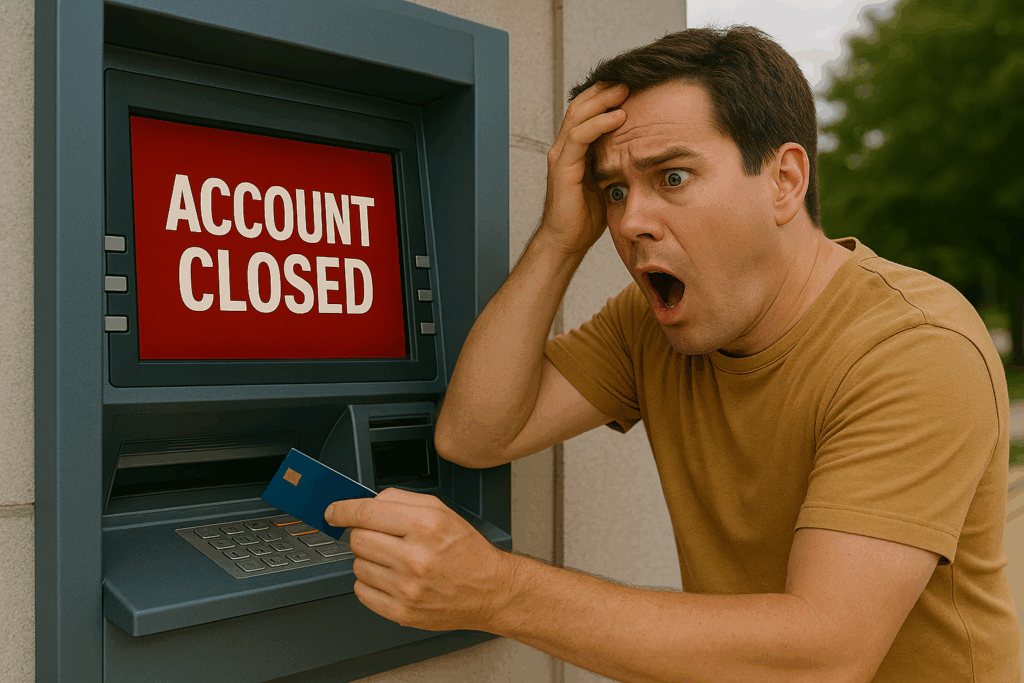What to Do if Your Bank Closes Your Account

Discovering that your bank has closed your account can be stressful and disruptive. Suddenly, you can’t access your money, make payments, or receive direct deposits. In some cases, banks close accounts without warning, leaving you scrambling to find a solution. Understanding why this happens and taking immediate action can help you regain financial stability.

Why Do Banks Close Accounts?
Banks close accounts for several reasons, and knowing why yours was closed can help you take the right next steps.
- Lack of activity: If you haven’t used your account for an extended period, the bank may consider it abandoned and close it. Most banks send a notice before doing so.
- Negative balance or overdrafts: Repeated overdrafts or an unpaid negative balance can result in account closure. If you consistently overdraw funds, your bank may view you as a financial risk.
- Violation of account terms: Not meeting minimum balance requirements or breaching other terms in your agreement can lead to closure. Always review your account terms to stay in compliance.
- Suspicion of fraud: Banks monitor accounts for unusual activity. If they detect transactions that seem fraudulent, they may freeze or close your account to prevent illegal activity.
What to Do if Your Bank Closes Your Account
If your account has been closed, take these steps immediately to minimize financial disruption and regain control.
1. Contact Your Bank Immediately
Call or visit your bank to ask why they closed your account. If you didn’t receive prior notice, request an explanation. Understanding the reason will help you determine your next move.
2. Settle Any Outstanding Balances
If your account was closed due to a negative balance, ask about repayment options. Banks often allow you to pay off the balance to avoid further penalties. If your account had money in it when it was closed, request a check or a transfer to another account.
3. Ask If You Can Reopen the Account
Some banks allow you to reopen an account, especially if it was closed due to inactivity. If reopening isn’t an option, ask if you can open a new account at the same institution before looking elsewhere.
4. Update Direct Deposits and Payments
If you had paychecks, government benefits, or automatic payments linked to the closed account, update them immediately. Contact your employer and service providers to switch your deposits and payments to another account.
Consequences of a Closed Bank Account
A closed account can create financial headaches beyond just losing access to your money. Here’s what you should prepare for:
- Debt Collection: If you had an unpaid negative balance, your bank might send it to a collection agency. This can damage your credit score and remain on your credit report for years.
- Limited Banking Access: Without a bank account, paying bills, receiving direct deposits, and managing daily expenses can become challenging. You may need to use money orders or prepaid debit cards in the meantime.
How to Prevent Future Bank Closures
To keep your bank account in good standing and avoid unexpected closures, follow these best practices:
- Monitor your balance: Set up alerts to track your account and prevent overdrafts. Make sure you maintain any required minimum balance.
- Use your account regularly: Even if you don’t use your account often, make occasional transactions to keep it active and avoid an inactivity closure.
- Avoid suspicious transactions: Large or unusual deposits can trigger fraud alerts. If you expect an unusual transaction, notify your bank in advance.
- Explore second-chance banking: If you’ve had trouble maintaining an account, look for banks that offer second-chance checking accounts designed to help rebuild a positive banking history.
The Bottom Line
Knowing what to do if your bank closes your account can help you take control of the situation quickly. Whether your account was closed due to inactivity, overdrafts, or suspicious activity, acting fast can prevent long-term financial consequences. By staying proactive, you can ensure smooth banking in the future
If you ever need expert assistance or guidance on your credit journey, don’t hesitate to reach out to the Nerds! Additionally, stay updated with the latest tips and information by following us on Facebook, Instagram and TikTok!

